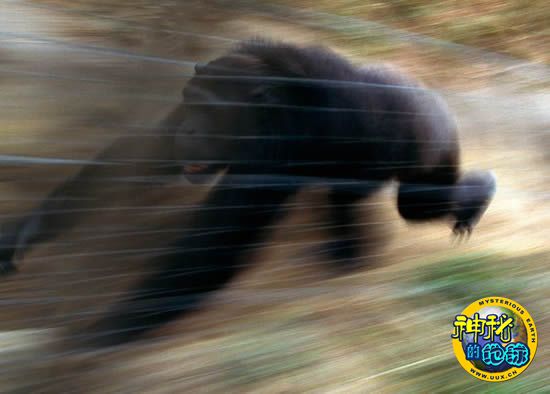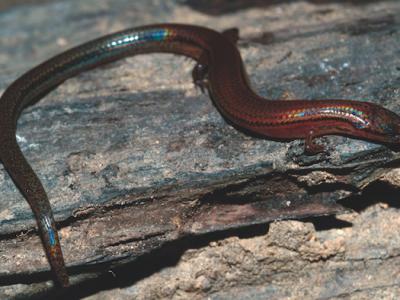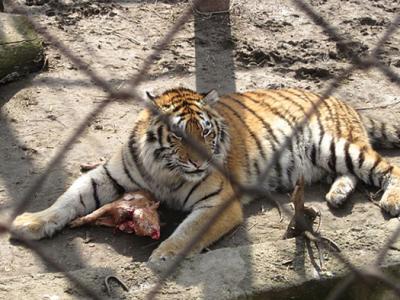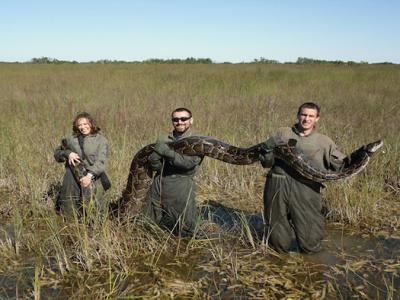Chimp Gangs Kill to Expand Territory
An adult male chimpanzee runs through Tchimpounga Sanctuary in the Republic of the Congo.
John Roach
for National Geographic News
Published June 21, 2010
Some gangs of chimpanzees beat their neighbors to death in bids to expand their turf, according to a new study.
While scientists have long known that chimps will kill each other on occasion, the finding shores up a long-held hypothesis that humans' closest living relatives sometimes turn to violence to annex valuable parcels of land.
Researchers observed predominantly male patrol groups sent out by a 150-strong chimp group at Ngogo in Kibale National Park in Uganda. The chimp gangs killed 21 of their neighbors between 1999 and 2008.
"Just fists and feet" were used in the attacks, study leader John Mitani, an anthropologist at the University of Michigan in Ann Arbor, said in an email from Uganda. "Multiple chimps pummel the victims with both [appendages]. I think the victims die from internal injuries.
"Victims are usually totally immobilized and don't really stand a chance of getting away," he added.
(Read "Chimps Use 'Spears' to Hunt Mammals, Study Says.")
Chimpanzee Territory Expansion
The Ngogo chimps have added bits and pieces to their 11-square-mile (29-square-kilometer) territory over the years, Mitani said.
"The surprising thing about last summer, though, was how much new land they took over," he said. "It was a sizable chunk of territory."
The 2.5-square-mile (6.4-square-kilometer) summer land grab suggests the ongoing violence amounts to a turf war for access to food.
The Ngogo chimps have already begun feasting on Morus mesozygia, a valuable fruit tree found in the newly acquired territory, Mitani noted.
In addition, researchers suspect that there may be a second benefit for the encroaching chimp group.
"Females from the neighboring group whose territory has been annexed might move into the Ngogo community," added Mitani, explaining that female chimps generally leave the groups they were born into when they reach puberty.
With their newly acquired land, the Ngogo chimp group might be seen as a more tempting destination for emigrating females, because the group controls more resources.
"This hasn't happened yet, [but] it still could. And in the future, more female chimpanzees might immigrate into the Ngogo community because of this land grab," he said.
(Also see "'Loving' Bonobos Seen Killing, Eating Other Primates.")
Chimp Gangs Offer Insight Into Ourselves?
The documented land grab is "exciting," said Jill Pruetz, an anthropologist at Iowa State University who studies chimps and other primates.
But she cautioned against applying the findings to all chimps, since "virtually no" killing of neighbors has been observed outside of the eastern chimpanzee subspecies (Pan troglodytes schweinfurthii).
"Generalizing to all chimps, including the other three subspecies, in terms of behavior is inappropriate and, given the tendency to expand such findings to speculating about human aggression, can be quite dangerous," she said in an email from Senegal, where she's observing savanna woodland chimps.
(Related: "Uncaring Chimps May Shed Light on Humans, Study Says.")
Study leader Mitani agreed that the findings probably reveal little about the much more varied and complex reasons that humans go to war. In fact, he said, the study might offer insight into the origins of human cooperation.
"The lethal intergroup aggression that we witnessed is cooperative in nature, insofar as it involves coalitions of males attacking others," he noted.
"In the process, our chimpanzees have acquired more land and resources that are then redistributed to others in the group."
Findings are published in the June 22 issue of the journal Current Biology.












